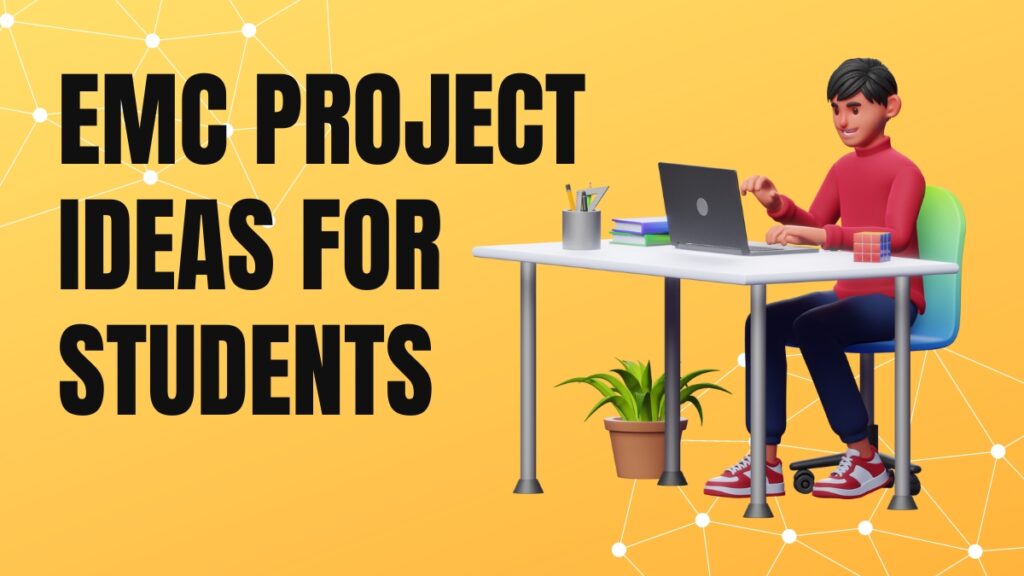Discover exciting EMC project ideas for students! Explore hands-on experiments and practical projects that teach Electromagnetic Compatibility concepts while having fun. Perfect for learning how electronic devices work together without interference.
Hey there! Curious about how electronic devices don’t mess with each other? That’s the magic of Electromagnetic Compatibility (EMC). It’s all about making sure gadgets work together smoothly without interference.
We’ve got some awesome and easy EMC project ideas lined up just for you. Explore hands-on experiments and practical projects that teach you how EMC works in real life. Have fun while you learn and see how electronic devices play nice with each other. Let’s jump in and explore!
EMC Project Ideas for Students PDF
What is EMC?
EMC stands for Entrepreneurship Mindset Curriculum. It teaches students to think like entrepreneurs.
With EMC, students learn to spot opportunities, solve problems creatively, and take smart risks. It builds skills in teamwork and leadership.
By using EMC, students develop the mindset and skills to succeed as entrepreneurs or in any organization.
Importance of entrepreneurial mindset for students
An entrepreneurial mindset helps students:
- Solve Problems: Get creative with solutions.
- Take Risks: Learn from challenges.
- Lead and Team Up: Work well with others.
- Be Creative: Think outside the box.
- Understand Finance: Know business basics.
- Have Confidence: Overcome obstacles.
- Keep Learning: Adapt and grow.
This mindset prepares students for success and future challenges.
Core components of EMC
The Entrepreneurship Mindset Curriculum (EMC) includes:
- Creativity: Think outside the box.
- Problem-Solving: Find and analyze solutions.
- Risk-Taking: Learn from challenges.
- Leadership: Lead and work well with others.
- Communication: Share ideas clearly.
- Financial Basics: Understand business finances.
- Market Analysis: Spot opportunities and needs.
- Business Planning: Plan for success.
These areas help students build strong entrepreneurial skills.
Key skills and competencies developed through EMC
The EMC curriculum builds key skills for entrepreneurial success:
Core Skills
- Problem-Solving: Finding solutions.
- Critical Thinking: Analyzing and deciding.
- Decision-Making: Choosing wisely.
- Creativity: Generating ideas.
- Innovation: Applying ideas practically.
- Communication: Sharing ideas clearly.
- Leadership: Guiding others.
- Teamwork: Collaborating effectively.
- Time Management: Meeting deadlines.
- Adaptability: Adjusting to change.
Entrepreneurial Competencies
- Market Analysis: Finding opportunities.
- Business Planning: Creating a strategy.
- Financial Management: Handling money.
- Risk Assessment: Identifying challenges.
- Sales and Marketing: Promoting products.
- Networking: Building connections.
- Negotiation: Making deals.
- Ethical Decision-Making: Choosing based on values.
Role of EMC in overall education
The Entrepreneurship Mindset Curriculum (EMC) shapes adaptable, future-ready individuals:
- Enhances Core Subjects: Boosts problem-solving and creativity.
- Future Skills: Develops innovation, communication, and teamwork.
- Lifelong Learning: Encourages continuous learning.
- Personal Growth: Builds confidence and resilience.
- Economic Impact: Supports job creation and growth.
- Social Impact: Inspires solutions for social issues.
EMC Project Ideas for Students
Check out EMC project ideas for students:-
Startup Ideation and Business Models
- Business Plan: Outline a startup idea.
- Product Concept: Design a new product.
- Pitch Deck: Create a pitch for investors.
- Market Research: Study the market.
- Customer Personas: Define target customers.
- Competitive Analysis: Research competitors.
- Value Proposition: Highlight what’s unique.
- SWOT Analysis: List strengths and weaknesses.
- Business Model Canvas: Sketch a business model.
- Feasibility Study: Assess idea viability.
Marketing and Branding
- Social Media Plan: Create a social media campaign.
- Brand Identity: Design a logo and brand style.
- Marketing Plan: Develop marketing strategies.
- Content Calendar: Plan content for marketing.
- Influencer Plan: Plan influencer partnerships.
- Email Campaign: Set up an email campaign.
- PR Strategy: Plan media outreach.
- Customer Journey: Map customer interactions.
- Brand Positioning: Define brand positioning.
- Online Ads: Design an ad campaign.
Product Development and Innovation
- Prototype: Build a product model.
- UX Testing: Test user experience.
- Feature Plan: Add new features.
- Sustainable Design: Plan eco-friendly design.
- App Prototype: Create an app mock-up.
- MVP: Develop a minimal product.
- Innovation Workshop: Brainstorm new ideas.
- Product Roadmap: Outline development stages.
- Feedback System: Collect user feedback.
- Market Testing: Test product in the market.
Financial Planning and Management
- Budget: Create a startup budget.
- Funding Proposal: Write a funding request.
- Cash Flow: Project cash flow.
- Break-Even: Calculate break-even point.
- Pricing Strategy: Set product prices.
- Expense Tracker: Track expenses.
- Profit/Loss Statement: Prepare financial summary.
- Financial Risks: Plan for financial risks.
- Investor Data: Prepare financials for investors.
- Budget Allocation: Distribute budget resources.
Sales and Customer Acquisition
- Sales Funnel: Design a sales process.
- Acquisition Plan: Plan to gain customers.
- Sales Pitch: Craft a sales pitch.
- Feedback System: Gather customer feedback.
- Loyalty Program: Set up a rewards program.
- Sales Training: Train sales teams.
- Lead Campaign: Run a lead generation campaign.
- Performance Metrics: Measure sales performance.
- Referral Program: Create a referral system.
- CRM System: Manage customer relationships.
Operations and Management
- Operational Plan: Plan daily operations.
- Team Building: Organize team activities.
- Supply Chain: Manage logistics and inventory.
- Performance Dashboard: Track key metrics.
- Risk Management: Address business risks.
- Process Improvement: Optimize processes.
- Training Program: Develop employee training.
- Customer Service: Plan customer service approach.
- Workflow Automation: Automate tasks.
- Operational Budget: Manage operational costs.
Project Ideas Based on EMC Core Competencies
Check out project ideas based on EMC core competencies:-
Creativity and Innovation
- Product Design: Create a new product or service.
- Rebranding: Redesign an existing product.
- Storytelling: Craft a compelling narrative.
- App Development: Design a new app.
- Innovation Workshop: Brainstorm solutions.
- Design Thinking: Solve a community problem.
- Marketing Campaign: Develop a creative campaign.
- Creative Problem-Solving: Tackle a challenge uniquely.
- Product Pitch: Present a new product idea.
- User Experience: Design a user-friendly interface.
Problem-Solving and Critical Thinking
- Case Study: Analyze and solve a business case.
- Market Research: Identify and profile a target market.
- Business Simulation: Make decisions in a simulated business.
- SWOT Analysis: Evaluate a startup idea.
- Scenario Planning: Plan for various business scenarios.
- Competitive Analysis: Research market competitors.
- Customer Feedback: Improve based on feedback.
- Operational Efficiency: Solve business process issues.
- Business Model Canvas: Create a business model.
- Cost-Benefit Analysis: Evaluate business decisions.
Risk-Taking and Resilience
- Failure Analysis: Study successful entrepreneurs’ failures.
- Growth Plan: Develop a resilience plan.
- Investment Analysis: Assess investment risks.
- Risk Management: Create a risk management plan.
- Challenge Simulation: Overcome setbacks in a simulation.
- Resilience Workshop: Design a resilience workshop.
- Recovery Plan: Plan for business setbacks.
- Failure Case Studies: Present entrepreneurial failures.
- Risk-Taking Challenge: Take and report on a risk.
- Crisis Plan: Develop a crisis management plan.
Leadership and Teamwork
- Student Business: Start and run a small business.
- Community Project: Lead a community service project.
- Negotiation Simulation: Practice negotiation skills.
- Team-Building: Organize team-building activities.
- Leadership Plan: Develop leadership skills.
- Volunteer Lead: Manage a volunteer team.
- Project Management: Oversee a team project.
- Mentorship Program: Create a mentorship plan.
- Conflict Resolution: Resolve team conflicts.
- Leadership Styles: Explore different leadership styles.
Communication and Presentation
- Elevator Pitch: Craft a business pitch.
- Public Speaking: Give a presentation on entrepreneurship.
- Social Media Campaign: Create a marketing campaign.
- Press Release: Write a press release.
- Pitch Deck: Design a pitch deck.
- Sales Presentation: Create a sales pitch.
- Video Marketing: Produce a promotional video.
- Storytelling Workshop: Teach storytelling techniques.
- Business Blog: Write blog posts on business topics.
- Brand Messaging: Develop key brand messages.
Financial Literacy
- Budgeting: Create a budget.
- Investment Analysis: Evaluate investment options.
- Financial Planning: Plan for a business.
- Cash Flow: Manage cash flow.
- Financial Statements: Analyze financial statements.
- Funding Proposal: Write a funding proposal.
- Profit Margin: Calculate profit margins.
- Expense Tracking: Track business expenses.
- Cost Analysis: Analyze product costs.
- Savings Plan: Develop a savings plan.
Real-World Project Examples
Check out real-world project examples:-
Product-Based Ventures
- Eco-Friendly Fashion: Create and sell sustainable clothing.
- Tech Gadget: Develop a unique tech accessory.
- Food Product: Invent a new food or drink.
- Home Décor: Design eco-friendly home items.
- Fitness Gear: Create innovative fitness tools.
- Personal Care: Develop natural personal care products.
- Educational Toy: Design a learning toy for kids.
- Pet Accessory: Make unique pet products.
- Health Supplement: Create a new health supplement.
- Travel Gear: Design practical travel accessories.
Service-Based Ventures
- Tutoring: Offer subject-specific tutoring.
- Event Planning: Organize events like parties or weddings.
- Digital Marketing: Manage social media or SEO services.
- Personal Coaching: Provide coaching in various areas.
- Home Cleaning: Start a cleaning service.
- Freelance Writing: Offer writing or editing services.
- Graphic Design: Provide design services.
- Virtual Assistant: Offer remote administrative support.
- Photography: Start a photography business.
- Tech Support: Provide tech assistance.
Social Entrepreneurship
- Community Clean-Up: Organize local clean-up efforts.
- Education Platform: Develop resources for underserved areas.
- Affordable Housing: Find solutions for housing issues.
- Food Rescue: Reduce food waste and aid those in need.
- Health Campaign: Promote health and wellness.
- Youth Mentoring: Set up a mentorship program.
- Sustainable Farming: Promote eco-friendly agriculture.
- Clean Water: Provide access to clean water.
- Recycling Program: Boost community recycling efforts.
- Local Art: Support and display local artists.
Challenges and Opportunities
- Resource Constraints: Operate with limited resources.
- Customer Base: Build and grow a customer base.
- Time Management: Balance school and business.
- Technology Use: Utilize digital tools effectively.
- Scaling Up: Grow a small venture.
- Regulatory Issues: Navigate local regulations.
- Financial Planning: Manage budgets and forecasts.
- Funding: Find ways to raise capital.
- Market Research: Identify new opportunities.
- Competitive Analysis: Study competitors and stand out.
Challenges and Considerations
Check out the challenges and considerations:-
Challenges of EMC Implementation
- Curriculum Fit: Integrate EMC without overloading students.
- Teacher Training: Prepare teachers to deliver EMC.
- Resources: Ensure adequate funding and materials.
- Assessment: Create methods to track student progress.
- Theory vs. Practice: Balance learning with hands-on experience.
- Risk Taking: Promote a culture of experimentation.
Considerations for EMC
- Diverse Needs: Adapt EMC for different learning styles.
- Business Partnerships: Work with local businesses for real-world experience.
- Mentorship: Offer guidance from experienced mentors.
- Ethics: Address ethical issues in projects.
- Long-term Impact: Evaluate how EMC affects students’ future careers.
Tips for Successful EMC Projects
Check out the tips for successful emc projects:-
Creativity and Innovation
- Brainstorming: Encourage free idea generation.
- Resources: Provide necessary tools and materials.
- Celebrate Failures: Promote learning from mistakes.
Building Strong Teams
- Diverse Teams: Include varied skills and backgrounds.
- Communication: Ensure open dialogue.
- Shared Goals: Set clear and inspiring objectives.
Mentorship and Support
- Industry Links: Connect with professionals.
- Mentors: Pair students with experienced guides.
- Resources: Ensure access to tools and funding.
Measuring Success
- SMART Goals: Set specific and achievable targets.
- Track Progress: Monitor project outcomes.
- Feedback: Collect input from all involved.
Continuous Improvement
- Refine Ideas: Adjust based on feedback.
- Learn from Setbacks: Use failures to improve.
- Adapt: Prepare for changes.
Use these tips to help students succeed in their EMC projects.
Which business is best for students?
Choosing a Student Business Venture:-
Online-Based Businesses
- E-commerce: Sell products online.
- Blogging/Content Creation: Earn through ads and sponsorships.
- Freelancing: Offer services like writing or design.
- Online Tutoring: Teach or coach online.
- Digital Marketing: Boost businesses’ online presence.
Service-Based Businesses
- Tutoring: Help students with their studies.
- Event Planning: Organize events.
- Cleaning Services: Clean homes or offices.
- Food Delivery/Catering: Provide food services.
- Pet Care: Offer pet sitting or walking.
Key Considerations
- Passion: Choose what interests you.
- Market Research: Know your audience.
- Financial Planning: Budget your startup costs.
- Time Management: Balance with your studies.
- Legal Compliance: Follow the laws.
Starting a business takes effort and flexibility. Learn from setbacks and adapt as needed.
How can a student start a business?
Starting a Business as a Student: A Simple Guide
Identify Your Passion and Skills
- Strengths: What are you good at?
- Interests: What do you enjoy?
- Market Research: Know your target audience and their needs.
Create a Business Plan
- Define Your Business: What will you offer?
- Set Goals: Short-term and long-term.
- Financial Planning: Budget and estimate costs.
- Market Analysis: Understand your market and competition.
- Legal Considerations: Know the legal requirements.
Secure Funding
- Personal Savings: Use your own money.
- Crowdfunding: Raise funds online.
- Loans: Look into student or small business loans.
- Investors: Seek support from family, friends, or investors.
Build Your Brand
- Brand Identity: Create a logo and slogan.
- Online Presence: Set up a website and social media.
- Networking: Connect with potential customers and industry people.
Launch and Grow
- Test and Feedback: Get customer opinions.
- Customer Relationships: Focus on satisfaction.
- Adapt and Learn: Adjust based on feedback.
- Mentorship: Find a mentor for guidance.
Note: Balancing a business with studies can be tough. Make sure to manage both effectively.
Conclusion
The Entrepreneurship Mindset Curriculum (EMC) gets students pumped with fun projects that boost their creativity and practical skills. Whether they’re dreaming up startup ideas, creating marketing plans, or solving real-world problems, EMC helps them think critically and creatively.
It gives them the experience and confidence to tackle business challenges head-on. Let’s inspire the next generation to turn their ideas into successful ventures and make a positive impact.
Meet Tom Latham from Good Project Ideas! He’s passionate about sparking creativity and making learning fun for all. Tom loves crafting engaging projects that inspire curiosity and hands-on exploration. Join him in bringing ideas to life!



